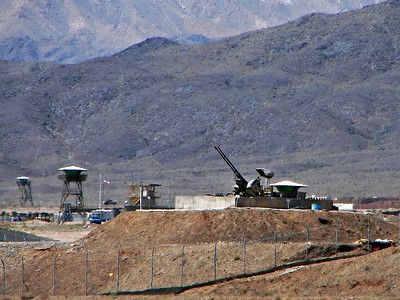 Anti-aircraft guns guarding Iran's Natanz nuclear facility. By openDemocracy
Anti-aircraft guns guarding Iran's Natanz nuclear facility. By openDemocracy
Iran’s Natanz Facility Incident Raises Questions About Future of Nuclear Deal
The Natanz nuclear facility of Iran suffered a “blackout” during the early morning hours on Sunday which may have caused serious damage to its centrifuges. The details are murky, and no one has officially claimed responsibility, but Iran was quick to blame Israel. The attack was allegedly a small, remote detonated explosion targeting an underground electrical substation that supplied energy to the thousands of centrifuges located in the Natanz facility. The Natanz facility has been the target of previous attacks, including the well-known Stuxnet worm that appeared in 2010 causing hundreds of uranium enrichment centrifuges to self-destruct. The latest Natanz incident, widely attributed to Israel, will stoke the hostility between Iran and Israel that has been commonplace for the past few decades and does not bode well for the Vienna meetings which began last week to discuss a resumption of the tattered Iran nuclear deal.
The head of Iran’s Atomic Energy Organization, Ali Akbar Salehi, labeled the incident an act of “nuclear terrorism” and Iran’s Foreign Minister, Javad Zarif, vowed revenge against Israel for the attack. Israel is known to be ultra-secretive when it comes to its military operations and will probably deny responsibility, but the incident is unlikely a coincidence. Israel has been vocal about its opposition to the Iran nuclear deal because of a feeling it empowers Iran’s nuclear program and is thus a national security concern. Moreover, Iran recently unveiled a new advanced centrifuge that would be capable of enriching uranium at a much quicker pace than its first generation centrifuges. Israel was undoubtedly aware of this development before it was announced publicly and may have decided to act on it.
Iranian officials have repeatedly maintained that its nuclear program is peaceful and for civilian purposes only, but Israel, and much of the West, have not been keen on believing it even after IAEA verification of enrichment levels. It is, however, easy to imagine at this point that Iran could be provoked into pursuing nuclear weapons due to seemingly increasing security threats from Israel. President Biden will need to act decisively in the coming days as the world prepares for increased escalation between the two enemies. This incident at Natanz could also be the defining point for the Biden administration’s relationship with Israel. Israel and the U.S. are engaging in the second round of strategic talks on Iran just days after the incident at Natanz. It is unclear whether the U.S. had knowledge of the operation beforehand, despite a history of intelligence coordination. If the attack was a surprise, it could’ve been a message for both Iran and the U.S.; stop enriching uranium and stop trying to broker a deal.
The Vienna talks will be in the shadow of the Natanz attack, but it is unclear to what extent the future of the JCPOA has been damaged. Both sides still have a vested interest in coming to some form of an agreement for the time being. Iran is still faced with U.S. sanctions and the U.S. is still concerned with the Iranian nuclear program. At the very least, however, this incident will likely strengthen Iran’s resistance to immediate reduction of its nuclear operations given its lost bargaining power. Tehran has already stated that it will begin enriching uranium to 60% once its facility is back online which is far above the levels enumerated in the Iran nuclear deal.
By destroying the internal power system at Natanz, predictions for recovery time have been placed at nine months. The Biden administration could capitalize on the incident since Iran is now in a weakened state, but the U.S. will likely have to make the first move in restoring its obligations under the original JCPOA. If President Biden makes a good faith effort to reduce sanctions against Iran in the wake of the Natanz explosion, it is possible that Iran would comply more readily, before resuming normal operation. One thing is for certain, the Biden administration’s diplomatic outreach to Tehran has been complicated and the future of a nuclear deal that was already tough just got tougher.





